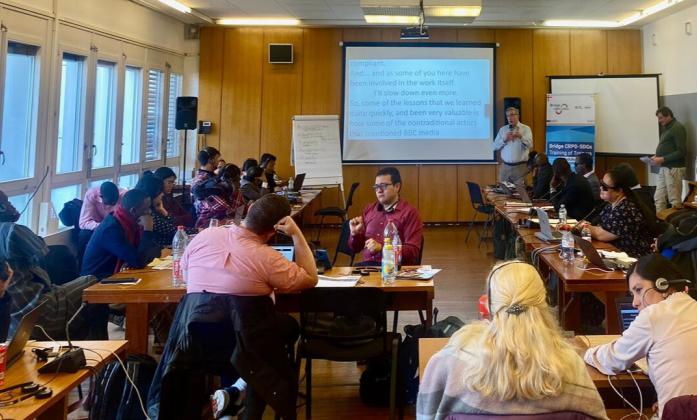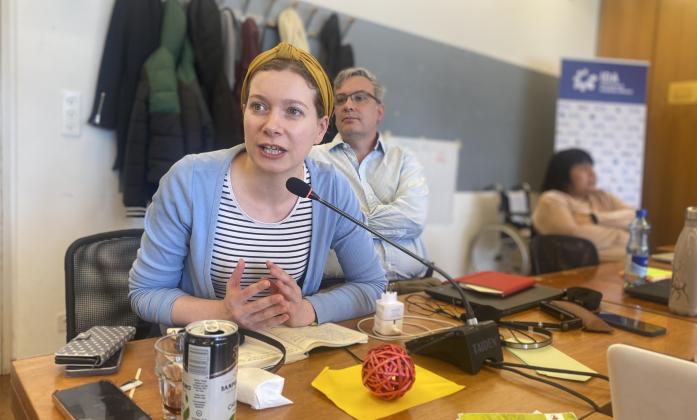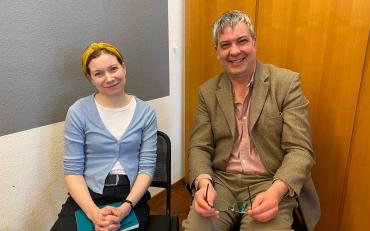In March 2023, the Bridge CRPD-SDGs Training of Trainers was organized by the International Disability Alliance (IDA) and the International Disability and Development Consortium (IDDC). We were thrilled to have the presence of Daryl Lloyd, Statistics Advisor and Lead of the Disability Inclusion Team and Harriet Knowles, Senior Programme Manager, Disability Inclusion Team from the Foreign, Commonwealth and Development Office (FCDO) as observers for the duration of the Training. The FCDO has been one of IDA’s key partners, having supported many initiatives, including, notably, the Bridge CRPD-SDGs training initiative, under the Disability Catalyst programme.

In this picture: Harriet Knowles and Daryl Lloyd of the Disability Inclusion Team, UK FCDO at the Bridge CRPD-SDGs Training of Trainers in Geneva, Switzerland
We had a chance to sit down with Daryl and Harriet to understand their reflections on the experience at the ToT Module A in Geneva and the importance of resourcing meaningful capacity building for OPDs. The duo further elucidates the significance of funding grassroots organizations that adopt an intersectional approach, as it plays a pivotal role in advocating for more robust initiatives concerning disability inclusion.
Q: How was your experience attending the Bridge CRPD-SDGs training in Geneva this week?
Daryl: This week has been an eye opener. One notable aspect was the exceptional efforts made by IDA to ensure that the entire event was fully accessible and catered to the diverse groups of disabilities. Witnessing the impact of Bridge training, with alumni showcasing their skills at the CRPD Committee and the Human Rights Council, was a clear indicator of the training's benefits and positive influence.
Harriet: We were deeply impressed by the rigorous ToT process and the leadership demonstrated by the participants, not only in the CRPD Committee but also in the discussions held throughout the training. The diversity among the participants was truly remarkable.
Q: In your experience, what should donors consider when investing in capacity building for OPDs?
Harriet: It is crucial to embrace a co-design approach and understand the specific investment needs of an OPD to support its own agenda, rather than a top-down approach where the donor decides the agenda.
Daryl: OPDs are not lacking in capacity. What they lack are the resources to fully utilize their existing capacity, knowledge, and skills. Trainings like Bridge CRPD-SDGs are instrumental in building that capacity and equipping OPDs with the necessary skills and knowledge to advocate for and drive change on the ground.
Harriet: In addition, the Bridge process and investment in this space also facilitate access to influential platforms, such as the UN. Without IDA's investment and support, it would be incredibly challenging for individual OPDs to access these spaces. We have witnessed firsthand the effort required to make such access possible.

In this picture: Daryl Lloyd interacting with the particpants of the Bridge CRPD-SDGs Training of Trainers
Q: As a donor, how do you believe barriers faced by OPDs can best be addressed?
Harriet: Donors should integrate OPD involvement across multiple programs, rather than solely relying on disability-specific investments, as the challenges faced by OPDs are diverse. Funding that aligns with the ambitions of the disability rights movement is crucial. We aim to apply the lessons learned from these funding models to our wider portfolio.
Daryl: It is evident that the strength of the movement lies in the collaboration among OPDs and other umbrella organizations. Donors should consider supporting this collaboration and funding initiatives that help organizations work together, enabling OPDs to achieve far more collectively than they would individually.
Harriet: Another idea we are exploring is how to adopt a more intersectional approach in our funding for grassroots organizations. This involves supporting OPDs to collaborate with women's rights organizations, LGBTQ+ organizations, indigenous people's organizations, and taking a broader view of inclusivity, including women with disabilities.
Q: How would you summarize the training in one word?
Harriet: Oh, that's a tough one! Inspired. After hearing from the participants, I am filled with admiration for IDA's efforts to make the training accessible. The participants' knowledge and recall of specific convention articles were impressive.
Daryl: I believe I have previously underestimated the technical knowledge, skills, and experience of OPD activists, advocates, and IDA. During an interaction with CBM's Michael Njenga, a Bridge alumnus, he shared that he carries a copy of the CRPD everywhere, demonstrating an extraordinary commitment to understanding its contents and applying them to real-world situations. Witnessing such dedication and proactive efforts is truly inspiring and reinforces our responsibility to ensure the wise and effective allocation of UK taxpayers' money. The reassurance is evident through the achievements of Bridge participants, such as their presentations at the CRPD committee, including compelling evidence about Argentina, and IDA's Rosario Galarza presenting at the Human Rights Council.

In this picture: Harriet Knowles talking to the particpants of the Bridge CRPD-SDGs Training of Trainers
We thank Daryl and Harriet for joining us at ToT A, to meet and interact with many of the grassroots OPD representatives whose work and trajectory were benefitted by trainings and initiatives supported by FCDO's work. Their participation set the ground for mutual learning.
This Bridge CRPD-SDGs ToT Module A was supported by the FCDO under the Disability Catalyst programme. The Catalyst programme focused on framing the implementation of the Sustainable Development Goals to be inclusive of all groups of persons with disabilities in line with CRPD and maximising the momentum of the Agenda 2030 for further implementation of the CRPD. Under this programme, IDA’s commitment to capacity building of OPDs from the grassroots levels on the linkages between the Agenda 2030 and the CRPD was strengthened through trainings, Fellowships and microgrants.
Along with this, IDA’s emphasis on the inclusion of underrepresented groups was reinforced with the flagship programmes on women, youth and indigenous persons with disabilities. Persons with disabilities from underrepresented groups were also included in trainings like Bridge CRPD-SDGs but also in Fellowship programmes. The Catalyst programme was externally evaluated in 2020, which resulted in positive findings that emphasized the significant role played by IDA. The evaluation recognized IDA as a facilitator of collective knowledge, and modelling the values and principles of intersectionality, the CRPD and inclusive international development.
Besides this, IDA has been involved in the Disability Inclusive Development consortium project, funded by FCDO, where again, Bridge CRPD-SDGs trainings were supported in many of the focus Countries of the project.
Find more information on the Bridge CRPD-SDGs Training Initiative Training of Trainers (ToT) Module A, Geneva, Switzerland 2023 here.
You can read more about the Bridge CRPD-SDGs training programme here.

